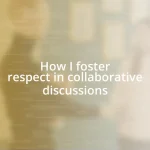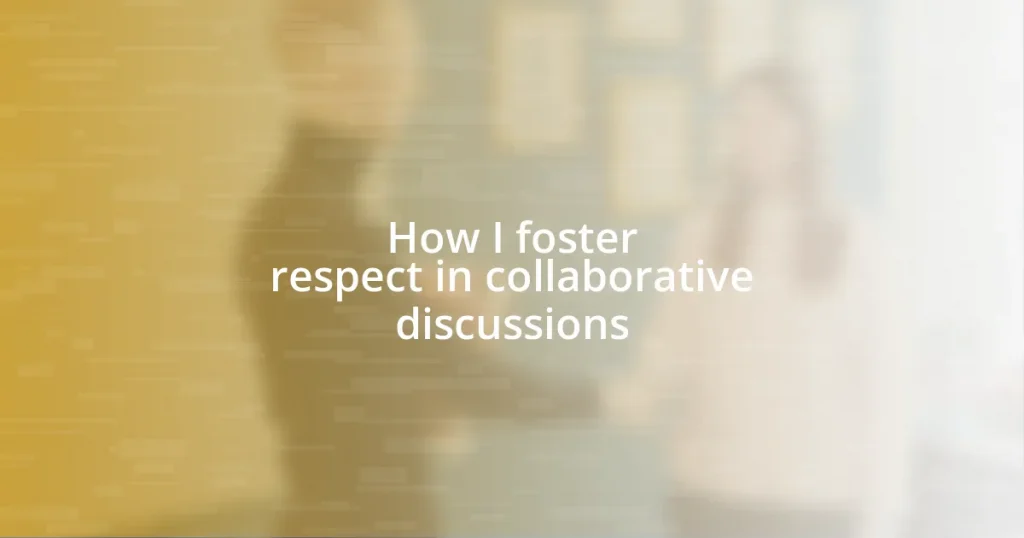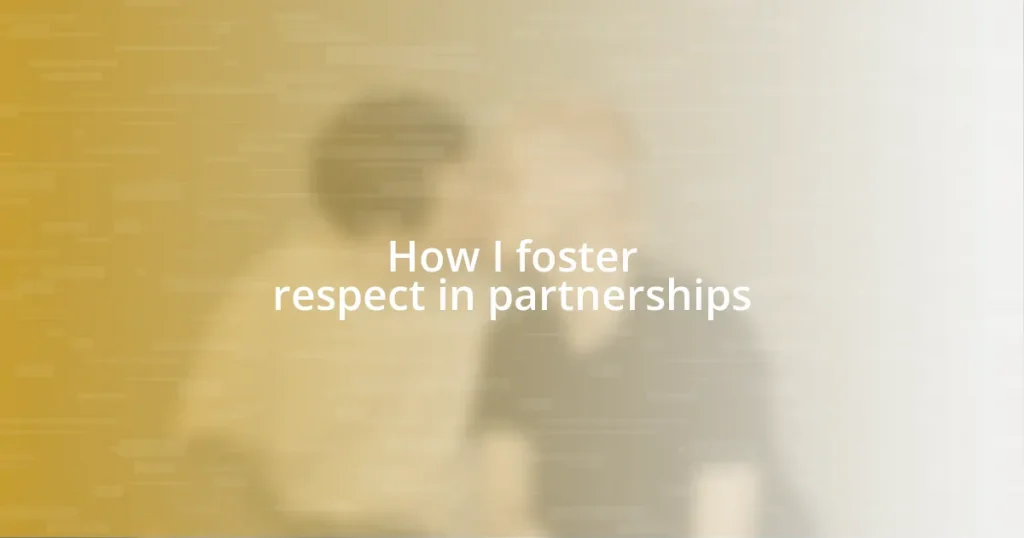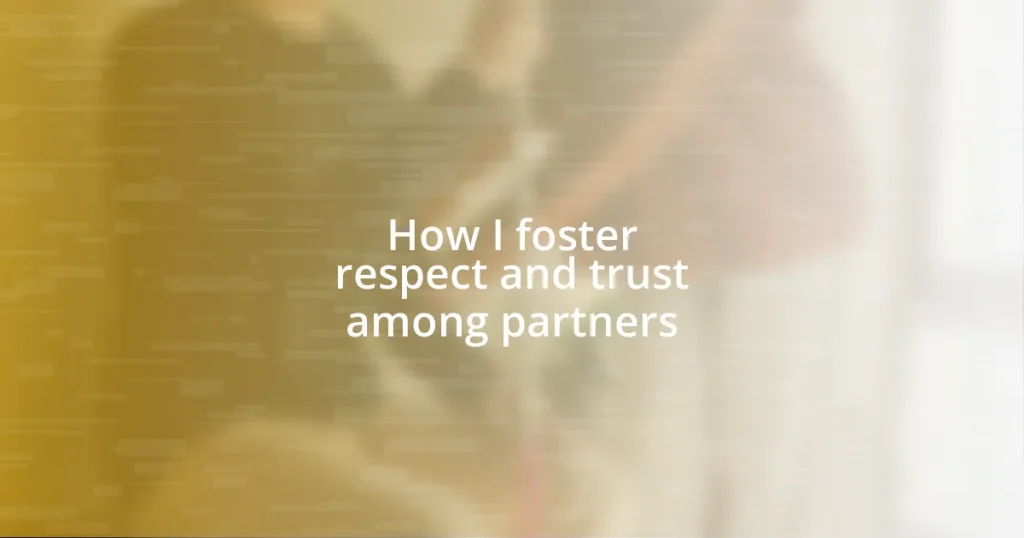Key takeaways:
- Respect fosters open dialogue, encouraging creativity and strengthening relationships in collaborative discussions.
- Establishing clear ground rules, such as active listening and valuing diverse opinions, enhances participation and productivity.
- Encouraging honest feedback and incorporating reflection sessions improves team dynamics and encourages vulnerability.
- Building trust through personal sharing and consistent behavior reinforces collaboration and enhances team cohesion.
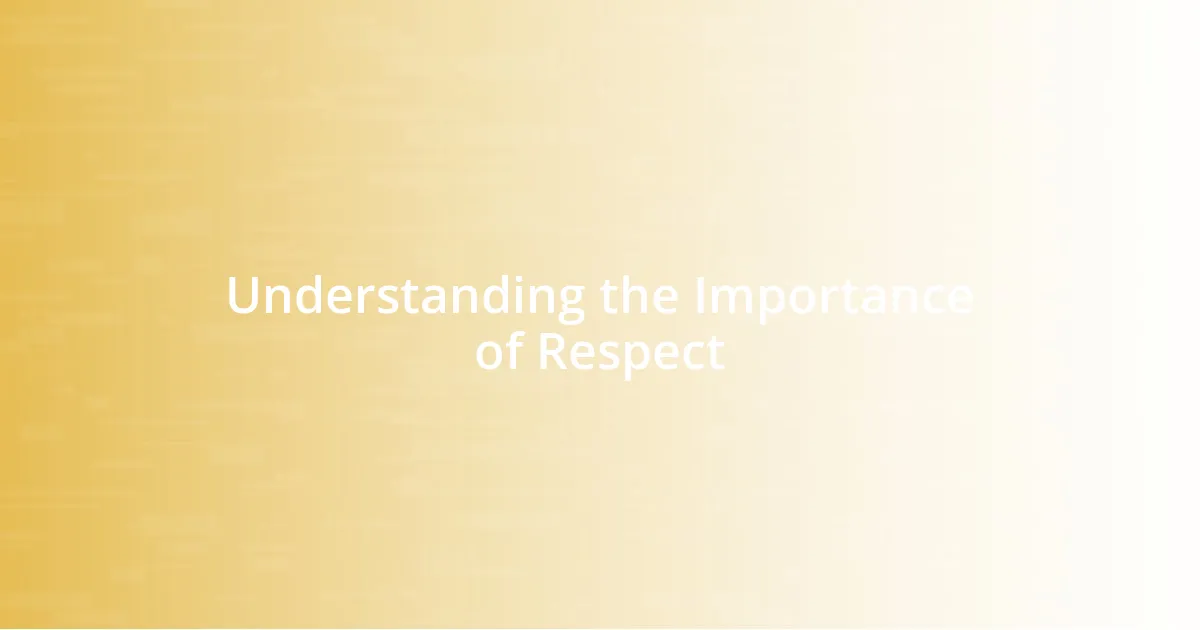
Understanding the Importance of Respect
Respect is the bedrock of any collaborative discussion. I remember a time when my team faced intense disagreements during a project meeting. A simple acknowledgment of each person’s viewpoint transformed the atmosphere—suddenly, we weren’t adversaries; we were allies working toward a shared goal.
When respect is present, it creates a safe space for open dialogue. Have you ever thought about how often ideas flourish in environments where individuals feel valued? I’ve witnessed firsthand how a respectful tone can elicit creativity, encouraging people to share their thoughts without fear of judgment.
The emotional impact of respect can’t be overstated. I’ve felt the difference between being dismissed and being heard, and it’s like night and day. Those moments when I genuinely listened to others not only strengthened our relationships but also made the discussions far more productive. Isn’t it fascinating how something so fundamental can have such profound effects?
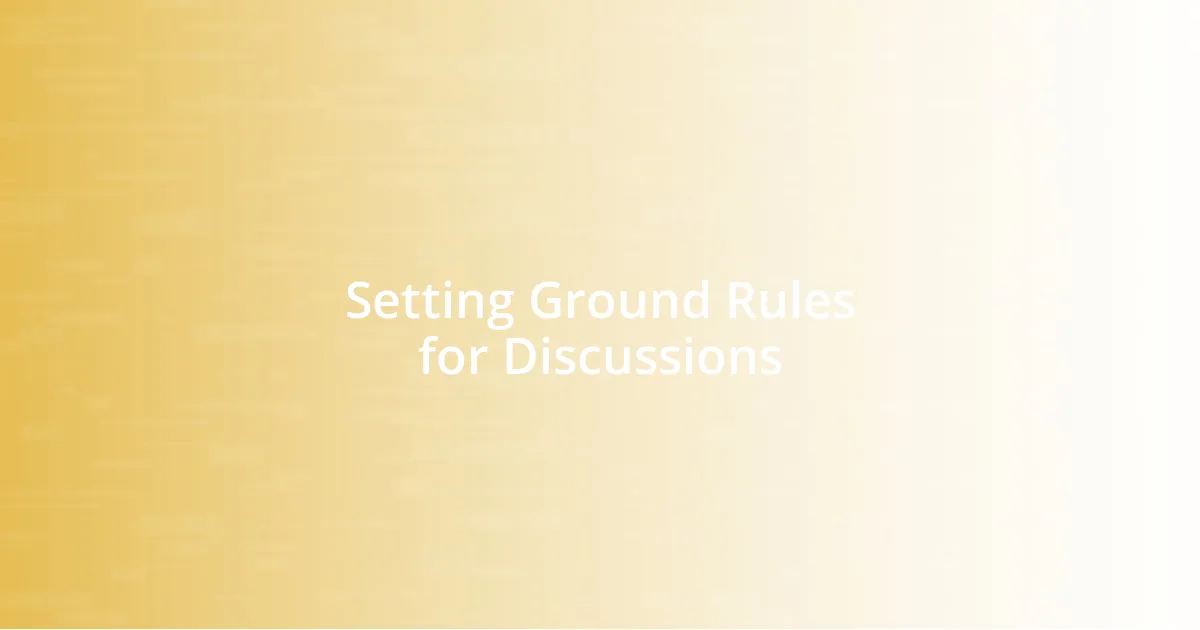
Setting Ground Rules for Discussions
Establishing ground rules at the start of a discussion feels almost like laying a solid foundation for a house. I recall a workshop where we implemented clear guidelines—it completely transformed our interaction. Suddenly, everyone felt empowered to speak up, knowing we had agreed on how to treat one another throughout the conversation.
Consider these essential ground rules for productive discussions:
- Listen Actively: Give others your full attention without interrupting.
- Encourage Diverse Opinions: Value all viewpoints—even those that challenge your own.
- Stay Respectful: Disagree without attacking; focus on the idea, not the person.
- Keep Contributions Constructive: Aim to build on others’ ideas rather than dismiss them.
- Set a Time Limit for Speaking: Ensure everyone has equal opportunity to share their thoughts.
Each rule serves as the glue that binds the group together and fosters an atmosphere of understanding. I remember how we collectively decided to keep each contribution brief. This practice not only minimized dominant voices but also ensured everyone’s input was heard—what a difference it made!
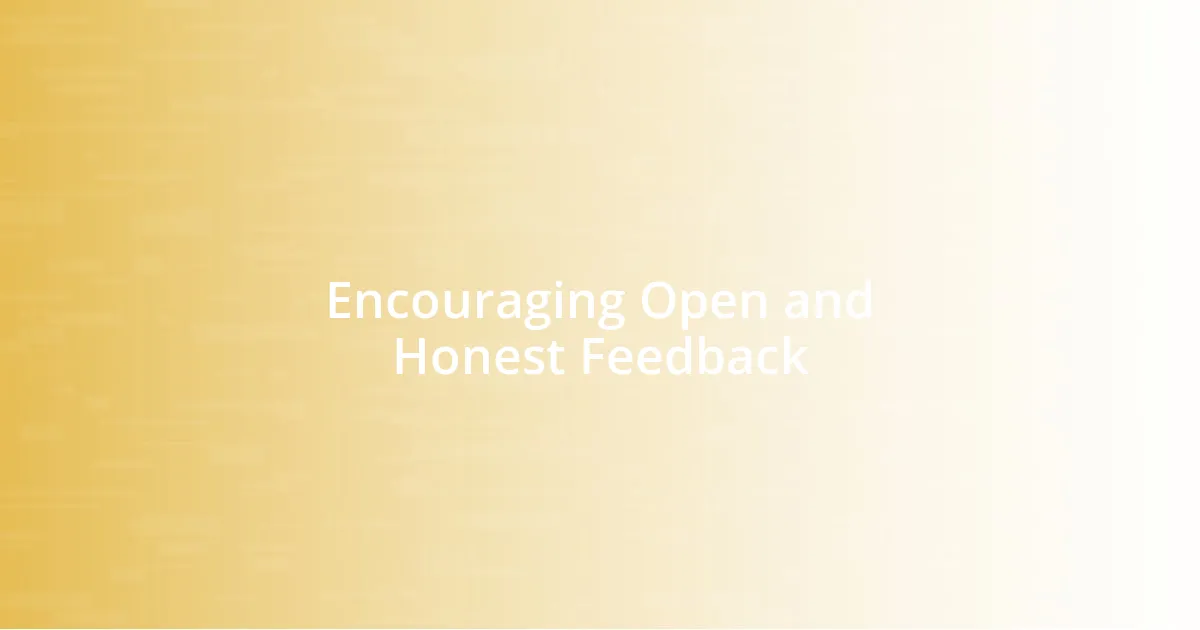
Encouraging Open and Honest Feedback
Encouraging open and honest feedback is crucial for enhancing collaboration. I find that when team members feel secure sharing their thoughts, the quality of our discussions improves dramatically. During one project, a colleague shared a concern about our approach—something I hadn’t considered. Their honesty led to a shift in our strategy that not only strengthened our outcome but also made everyone more willing to voice their thoughts in future meetings.
Creating an environment where feedback is not only accepted but encouraged requires intentionality. I remember a group I worked with where we routinely ended our sessions by inviting thoughts on how we could improve our discussions. Surprisingly, this became a highlight for many team members. The opportunity to reflect openly on our processes helped everyone feel more valued and engaged. It’s amazing how fostering that habit transformed our interactions.
In my experience, timing matters when inviting feedback. I’ve learned that asking for input while emotions are still fresh can lead to more genuine insights. One time, after a heated debate, I paused and asked for thoughts on our communication style. The raw honesty that followed not only cleared the air but also cemented trust within the group. It showed me that vulnerability often gives way to deeper connections and enhanced collaboration.
| Effective Feedback Practices | Impact on Team Dynamics |
|---|---|
| Active Listening | Encourages participation and ensures everyone feels heard. |
| Regular Check-ins | Promotes ongoing dialogue and continual improvement. |
| Constructive Criticism | Helps refine ideas and fosters a culture of growth. |
| Anonymous Feedback Channels | Provides a safe outlet for honest reflections. |
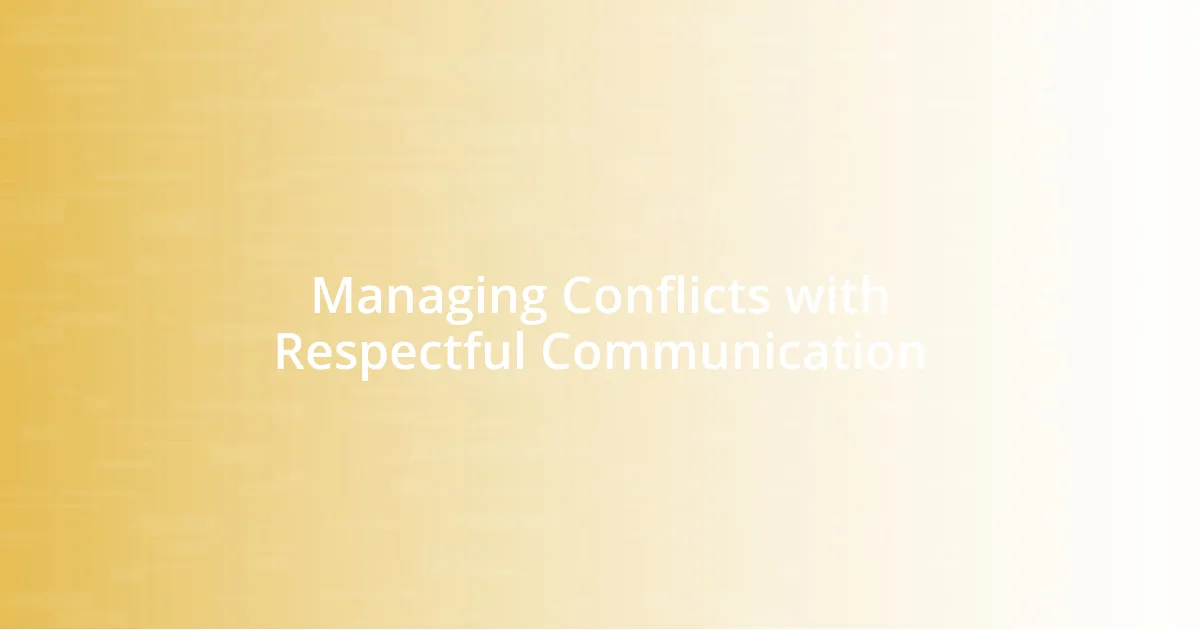
Managing Conflicts with Respectful Communication
Navigating conflicts with respectful communication can be challenging, but I’ve found that approaching disagreements with empathy makes all the difference. In one instance, during a team review, two members clashed over the best approach to a project. Instead of allowing tensions to escalate, I encouraged each person to reframe their statements to focus on the impact of their ideas rather than personal preferences. This simple shift turned a potential argument into a productive dialogue, revealing underlying needs that had previously gone unaddressed.
I believe that the key to managing conflicts respectfully lies in understanding the emotions at play. I still remember a time when I felt dismissed during a discussion, which only fueled my frustration. When I finally mustered the courage to express how it felt to be sidelined, it opened the door for others to share similar experiences. This collective vulnerability not only diffused the tension but fostered a newfound respect for each other’s perspectives. Doesn’t it make you wonder how often unresolved feelings can complicate our collaborative efforts?
Another effective technique I’ve employed is incorporating a “pause and reflect” moment during discussions. This practice encourages everyone to take a breath and reconsider their points before responding, which can help cool strong emotions and lead to more thoughtful interactions. I recall a particularly heated session where I proposed a short break. When we reconvened, the energy had shifted, and the team collaborated more harmoniously. It was astonishing to observe how a small interruption could lead to more respectful exchanges, reinforcing the value of communication during conflicts.
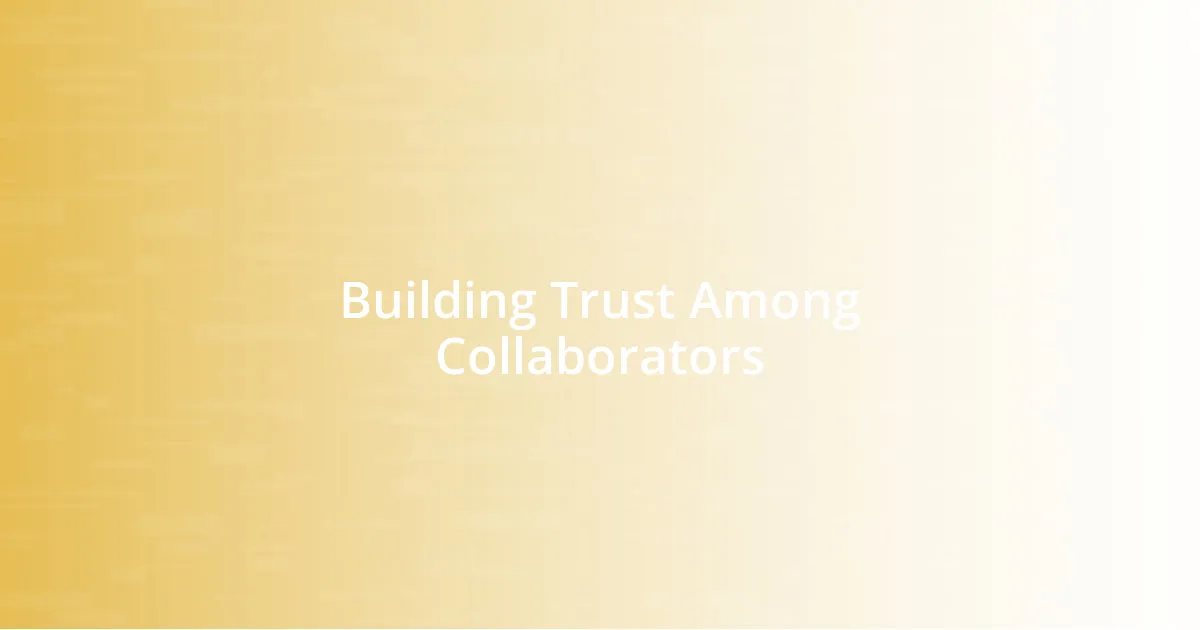
Building Trust Among Collaborators
Building trust among collaborators is essential for fruitful teamwork. I’ve learned that sharing personal experiences can lay a strong foundation for trust. For instance, during a project kickoff, I decided to share a past mistake I made, which not only disarmed the room but also encouraged team members to let their guard down. It was eye-opening to see how quickly vulnerability can bridge gaps.
Trust also grows through consistency in behavior. I remember working with a colleague who always responded to emails promptly and followed through on commitments. Their dependable nature made me feel secure in our collaboration. Isn’t it interesting how small actions can cumulatively build a solid trust base? When people see that you’re reliable and genuine, they’re much more likely to reciprocate.
Additionally, I find that shared goals can enhance trust significantly. During a brainstorming session on a challenging initiative, we took the time to outline our collective objectives. By aligning our individual contributions with the group’s mission, I observed a notable shift in dynamics. Team members began to support each other more actively, feeling like they were part of something bigger. Isn’t that the essence of collaboration—to create an environment where everyone feels invested?
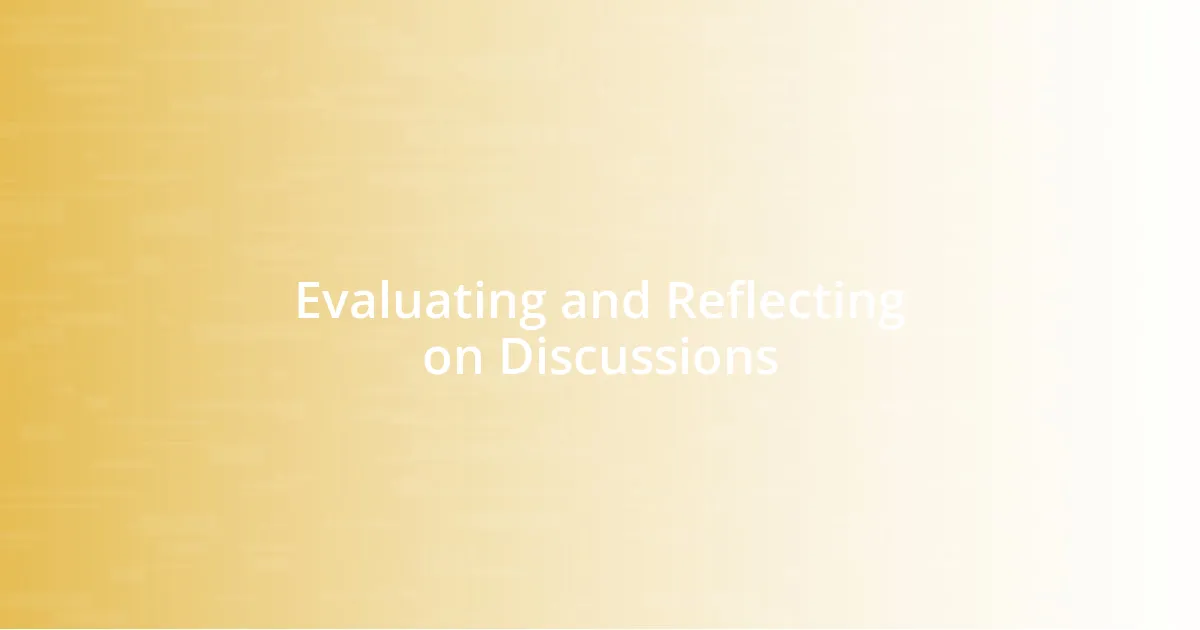
Evaluating and Reflecting on Discussions
Reflecting on discussions is a critical step in fostering respect and growth. After each meeting or collaborative effort, I make it a point to set aside time for honest evaluation. There was one occasion when my team and I gathered after a challenging project review. Instead of simply focusing on what went wrong, we highlighted the positives first, which created an atmosphere of gratitude. It was amazing to see how this approach shifted our mindset and fostered a refreshing openness to discussing areas for improvement.
I find that asking specific questions during our reflection sessions brings deeper insights. For instance, I often inquire, “What made us feel most heard today?” or “Was there a moment where we could have practiced more patience?” These inquiries not only encourage everyone to voice their thoughts but also deepen our understanding of each other’s viewpoints. One particular reflection session stands out, where one team member shared that they felt overlooked. This prompted a broader conversation about how everyone’s contributions could be better recognized, ultimately enriching our collaborative dynamic.
Moreover, reflecting on our discussions allows us to identify patterns that may affect our interactions. After recognizing a trend of interruptions during our exchanges, I initiated a new “speaking order” technique. Each person would have an uninterrupted minute to share their thoughts. When I shared this change in approach, I felt a wave of relief in the room—everyone was eager to listen. It just goes to show how small adjustments can lead to meaningful respect among team members. Have you ever noticed how simple shifts can spark profound improvements in collaboration?

